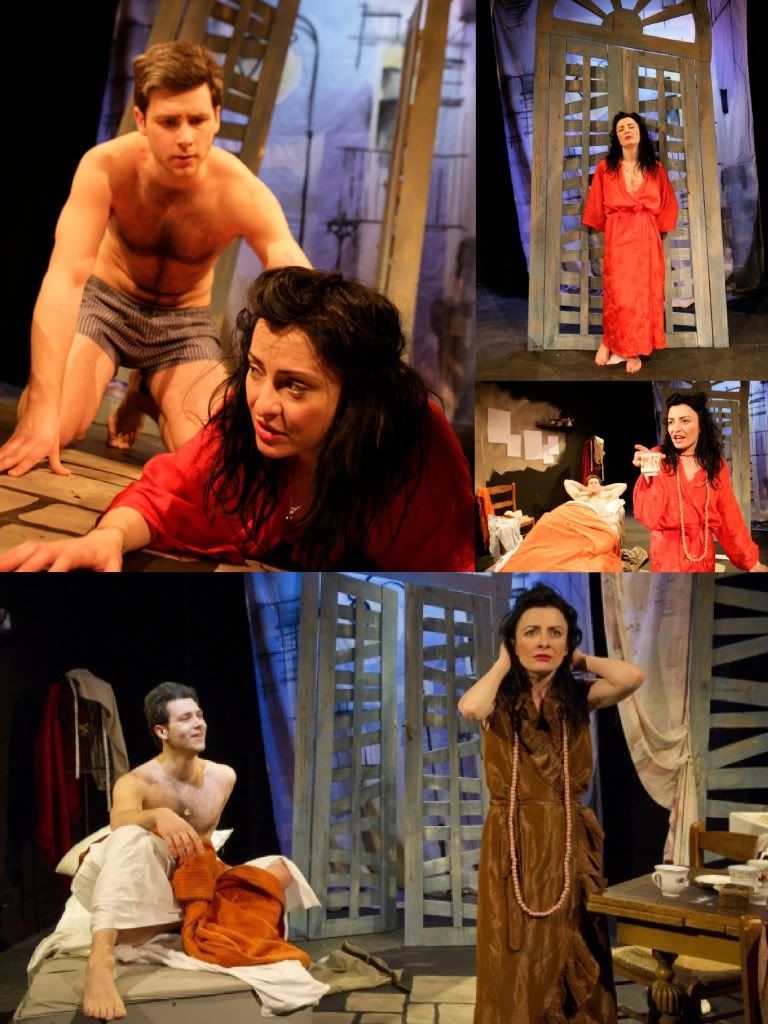This one was a bit of a last minute impulse purchase for me – though one I’m so glad I indulged in despite initial reservations (brought on by Kilburn seeming a bit rough, the resentful pub crowd seeming somewhat rougher and the fact that the entire rest of the audience seemed to know each other – I think, based on the fact that I was proffered a glass of something bubbly on my way out, that I’d accidentally stumbled upon a press night). I should not have worried, however, as I ended up really adoring the production.
I suppose, it was the play itself that won me over. A premiere of a Tennessee Williams play is hard to resist in itself (I’m a fan of his, there’s something about the flow and taste of his language that’s utterly compelling) – but this one also managed to weave in a huge number of things that I loved. Things like stories about the theatre and the ways in which we choose to tell stories, messed up narratives, layers of understanding and a truly messed up relationship at the centre. It had all of them.
The play used a really interesting structure – it started fairly normally with a scene in a small New Orleans apartment unrolling – but part way through this scene one of the actors suddenly broke the moment and spoke to the audience. Or, rather to the director of the play sat amidst the audience and it was suddenly clear that we weren’t in New Orleans, instead we were in a rather difficult dress rehearsal. From then the interruptions continued, whether it was from the actors or the plays writer sat at the back of the stalls. One of my favourite of these moments was when during a rather sensual sex scene the actress suddenly switched in a second to question the language – actually I was highly impressed throughout how Shelley Lang handled the transitions between the two roles and how clearly she’d defined the two. I also thought it was clever how the production hid the writer and the director with the audience, it was a real shock the first time they interrupted – especially as the actors involved had been wandering around the bar before the show began.
The other benefit of this structure was that it was fascinating to hear Williams, through the voice of the writer, played excellently by Keith Myers, giving us his insight into what was going on – adding beautiful layers of understanding to the play. The ending in particular was absolutely incredible because of this, as the writer - who had been something of a ridiculous, cumudgeonly figure throughout the play – revealed both to himself and the actors and, by extension, the audience – the real depths of the play and the tremors of that ran through the theatre.
Despite these breaks though, the story of the play within the play didn’t lose power for me – for long stretches I got completely lost in the story and was utterly sold on the central relationship, unhealthy though it was. The interruptions provided understanding and frequently comedy (the scene with Graham Dickson's stage manager Hilary was a favourite for me) and a relief from the deep claustrophobia of the other scenes but without loosing them in any sense. In some ways it was as if you needed the lightness of them to contrast with the darkness of the rest – to set them in relief. It meant you could be incredibly moved one moment and laughing the next. And for me it was perfect.
Though it was the play that I fell in love with, the production certainly did it proud. The set was relatively simple but created a fantastically atmospheric, dimly lit, claustrophobic, slightly off-kilter environment. There was also some lovely lighting touches – I’m a sucker for dark stages where a single match/candle/cigarette/birthday cake lights up the actor. I also thought the use of sound was absolutely fantastic throughout, the outside world stealing in. All in all it was a fab production.

No comments:
Post a Comment